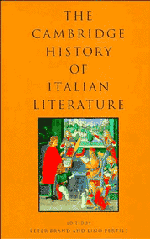Book contents
- Frontmatter
- Origins and Duecento
- 1 The earliest evidence
- 2 Poetry
- 3 Prose
- The Trecento
- The Quattrocento
- The Cinquecento
- The Seicento: Poetry, Philosophy and Science
- Narrative prose and theatre
- The Settecento
- The Age of Romanticism (1800–1870)
- The Literature of United Italy (1870–1910)
- The Rise and Fall of Fascism (1910–45)
- The Aftermath of the Second World War (1945–56)
- Contemporary Italy (since 1956)
- Bibliography
- References
3 - Prose
from Origins and Duecento
Published online by Cambridge University Press: 28 March 2008
- Frontmatter
- Origins and Duecento
- 1 The earliest evidence
- 2 Poetry
- 3 Prose
- The Trecento
- The Quattrocento
- The Cinquecento
- The Seicento: Poetry, Philosophy and Science
- Narrative prose and theatre
- The Settecento
- The Age of Romanticism (1800–1870)
- The Literature of United Italy (1870–1910)
- The Rise and Fall of Fascism (1910–45)
- The Aftermath of the Second World War (1945–56)
- Contemporary Italy (since 1956)
- Bibliography
- References
Summary
Non-fictional works
While the language, thematics and culture of vernacular poetry developed rapidly through competing attempts to come to terms with the powerfully suggestive, relatively unified courtly lyric of Provence, vernacular prose literature evolved much less uniformly and easily. Culturally, there was no single body of material demanding attention and admiration: instead there were many different potential models, each with its own traditions and readership. Linguistically, the situation was no more clear-cut. If French prose literature was a precocious phenomenon, it was nevertheless dwarfed by its Latin parent, even in France; Latinity in Italy was in an even more predominant position. Many of the dialects indeed had no tradition of writing at all. Learning to use Latin as a written medium was, however, a major investment in time and money, not undertaken lightly. For lawyers and clerics, the pay-off could be justified by professional opportunities and efficiency. Changing patterns of economic and political activity in the expanding communes meant that other groups, hitherto illiterate, were beginning to require records of transactions. For the unlettered who merely needed occasional written corroboration, it was better to use a notary, who could provide an instant technical translation. Increasingly, though, merchants, bankers and politicians sought regular, confidential records. There was an incentive for them to acquire the skills themselves: fragments of a Florentine bank ledger dating from 1211 clearly show a developing utilitarian jargon in the vernacular entries. The progress of mercantile literacy from book-keeping to book-writing would reach its culmination in the Trecento, when Boccaccio, a banker himself, would make his mark in both prose and epic poetry.
- Type
- Chapter
- Information
- The Cambridge History of Italian Literature , pp. 28 - 36Publisher: Cambridge University PressPrint publication year: 1997

